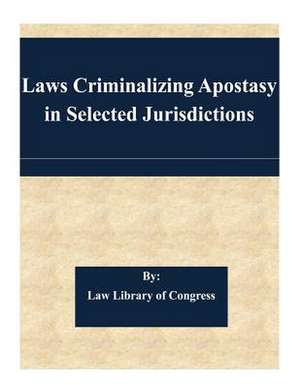Laws Criminalizing Apostasy in Selected Jurisdictions
Autor Law Library of Congressen Limba Engleză Paperback
Preț: 92.37 lei
Nou
Puncte Express: 139
Preț estimativ în valută:
17.68€ • 18.10$ • 14.70£
17.68€ • 18.10$ • 14.70£
Carte disponibilă
Livrare economică 25 februarie-11 martie
Preluare comenzi: 021 569.72.76
Specificații
ISBN-13: 9781505345049
ISBN-10: 1505345049
Pagini: 24
Dimensiuni: 216 x 279 x 1 mm
Greutate: 0.08 kg
Editura: CREATESPACE
ISBN-10: 1505345049
Pagini: 24
Dimensiuni: 216 x 279 x 1 mm
Greutate: 0.08 kg
Editura: CREATESPACE
